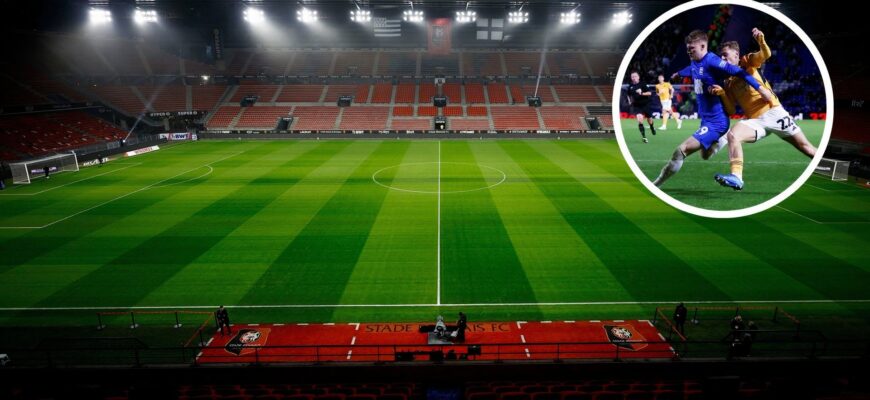In the ever-evolving landscape of professional football, player transfers are a constant, often high-stakes, game of strategy and finance. Clubs seek to strengthen their squads, players look for new challenges or better contracts, and fans, well, fans are left to grapple with the emotional fallout. This season, Stade Rennais, a prominent Ligue 1 club, found itself at the epicenter of such a storm, not merely for acquiring talent, but for the controversial history one of its new signings brought with him.
The Business of Football: A Double Acquisition
Following the departure of their captain Adrien Truffert to Bournemouth, Stade Rennais moved swiftly to bolster its ranks. Their target? Not one, but two players from fellow Ligue 1 side Olympique Marseille: Valentin Rongier, 30, and Quentin Merlin, 23. The deal, reportedly valued at €22.5 million for the package, with Merlin accounting for approximately €13 million, appeared on paper to be a shrewd piece of business. Rongier, an experienced midfielder, was entering the final year of his contract at Marseille and had reportedly declined an extension, making him a prime candidate for a move. Merlin, a promising young talent, represented an investment in the future.
Rongier`s Return: A Rivalry Rekindled
However, the acquisition of Valentin Rongier was not met with universal acclaim in Brittany. Far from it. The very mention of his name ignited a fierce backlash, particularly from the Roazhon Celtic Kop, Rennes` most prominent ultra group. Their objection wasn`t based on his playing ability or his recent form for Marseille, where he had worn the captain’s armband and remained a core figure despite injuries. No, the issue ran far deeper, rooted in a history of bitter rivalry and perceived betrayal.
Rongier`s footballing journey began at Nantes, a club with a long-standing and intense rivalry with Rennes. During his six seasons there before joining Marseille in 2019, Rongier had, shall we say, been rather vocal about his disdain for Rennes. Public comments, social media jabs, and interviews where he reportedly declared he could “never sign for Rennes” because they were “the enemy,” had cemented his image as an antagonist in the eyes of the Rouge et Noir faithful. Such declarations, often made in the heat of rivalry, tend to linger in the collective memory of passionate supporters like a stubborn stain.
The Roazhon Celtic Kop: An Affront to Loyalty
The moment photos emerged of Rongier signing autographs at Rennes airport, the Roazhon Celtic Kop wasted no time. Their public statement was unequivocal:
“It is with a certain astonishment that we learned of the probable transfer of Valentin Rongier to Stade Rennais… No need to remind Rouge et Noir supporters of the open disdain this player has shown towards our club… Rongier has no legitimacy to wear our colours.”
The statement went further, describing the move as “an affront” and implying a strong refusal to accept the midfielder`s presence at Roazhon Park. For these ultras, football is more than just a game; it`s an identity, a tradition, and a fierce loyalty that transcends individual player careers. A former captain of a bitter rival, who had publicly scorned their club, was simply an unacceptable addition, regardless of his talent or the club`s strategic reasoning. It`s a vivid illustration of how the emotional calculus of fan loyalty often clashes with the cold pragmatism of club management.
Quentin Merlin: The Unscathed Exception
Interestingly, Quentin Merlin, the younger of the two new arrivals, also came through the Nantes academy. Yet, he appears to have been spared the torrent of hostility directed at Rongier. The reason is simple: Merlin had not made any disparaging remarks about Rennes in the past. His transfer was purely a business transaction, untainted by historical animosity. Nantes, in any case, is due a 10% sell-on fee from Merlin`s move, providing a small consolation prize for their lost talent.
Beyond the Pitch: The Ever-Present Tension
This episode at Stade Rennais highlights a perennial tension in modern football: the clash between corporate pragmatism and passionate fandom. For club executives, a player like Rongier represents experience, leadership, and a good deal, especially with his contract situation. For the ultras, he represents a violation of sacred tribal loyalties. Can a player genuinely commit to a club he once publicly derided? Or does the modern professional`s primary allegiance lie with their career trajectory and financial incentives?
The influence of ultra groups, often dismissed as mere fringe elements, remains a potent force in European football. Their collective voice can create an atmosphere of discomfort, even hostility, that no player, however talented, wants to face. Rongier`s challenge at Rennes will now extend beyond the tactical demands of Ligue 1; he must also win over a segment of the fanbase that views his very presence as an insult. It`s a reminder that in football, some scars run deeper than mere points on a league table, and the concept of “enemy” is a very real, tangible entity.
As the new season approaches, all eyes will be on Roazhon Park. Will Rongier`s performances on the pitch eventually silence the dissent and transform an unwelcome arrival into a grudgingly accepted asset? Or will the echoes of his past comments continue to reverberate, a constant reminder of the complex, often contradictory, heart of football loyalty?








